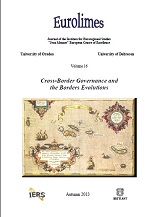The Socio-Economic Function of Borders, Evidence from EU Neighbourhood Countries
The Socio-Economic Function of Borders, Evidence from EU Neighbourhood Countries
Author(s): Abel PoleseSubject(s): Politics / Political Sciences
Published by: Editura Universitatii din Oradea
Keywords: Border; Bessarabia; Moldova; Poland; Smuggling; Ukraine
Summary/Abstract: Literature on different aspects of borders is quickly growing in the social sciences. Not only geopolitical but also economic and social aspects of very diverse borders have been explored. This continues the currently ongoing exploration of borders but it focuses on an aspect that, in our view, is understudied. We refer here to the informal function of a border that emerges from the clear conflict between an official narrative of a state, condemning certain actions, and an unofficial discourse that in the end allows them, not to say prompts people to engage with them. This paper is an exploration of the grey zones emerging from state weakness and the necessity citizens have to get to the end of the month. Case studies have been constructed from two border regions in Ukraine. One is the border between Poland and Ukraine with L'viv and Rzeszow as local capitals, the other is the border between Ukraine and Moldova with Odessa and Chişinău as main cities but, in reality, most of the trade ending up in Tiraspol, the capital of Transdnistria.
Journal: Eurolimes
- Issue Year: 2013
- Issue No: 16
- Page Range: 40-49
- Page Count: 10
- Language: English
- Content File-PDF

